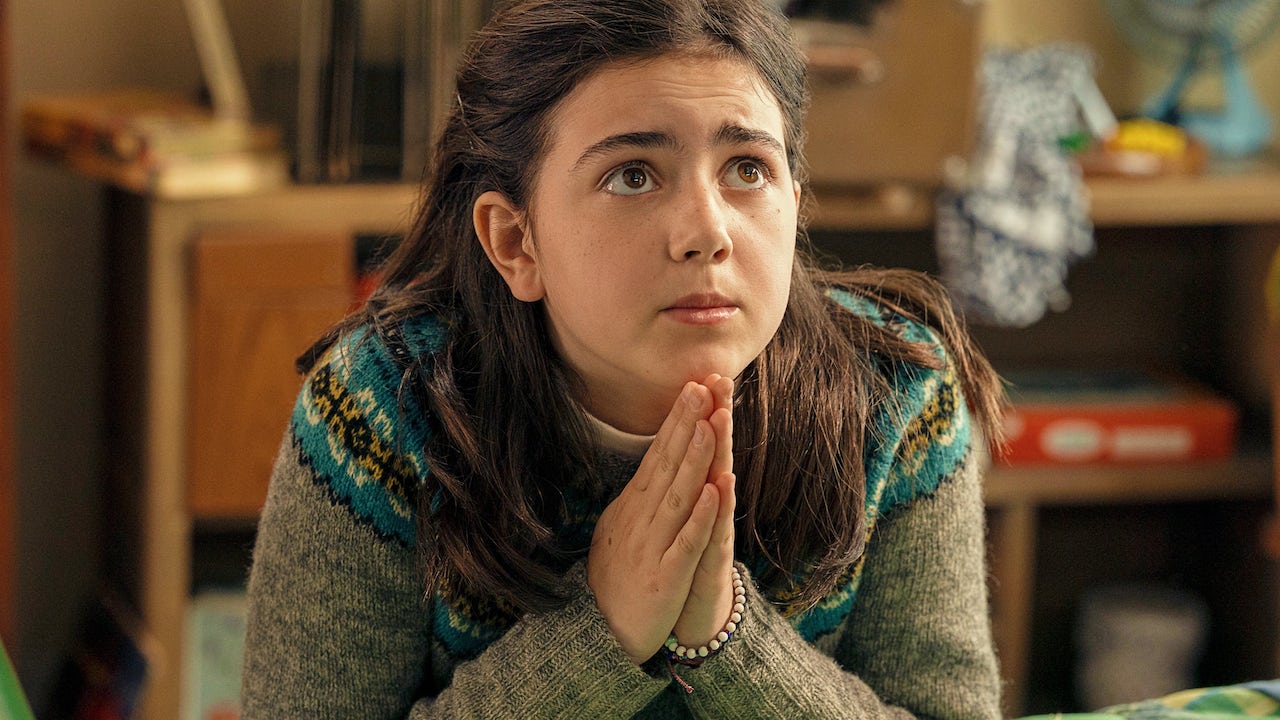Judy Blume’s Are You There, God? It’s Me, Margaret gets a heavenly adaptation

Now available to rent in the UK, Are You There, God? It’s Me, Margaret is a warm, funny education for yearning tweens and their grown-up parents alike. Eliza Janssen gives praise to director Kelly Fremon Craig and coming-of-age deity Judy Blume.
Are You There God? It's Me, Margaret
Are you there, Judy Blume? It’s just us, checking in: the generations of awkward teens who found solace in your classic coming-of-age novels. Crafted with humour, heart, and an open mind for big, existential questions, this new feature is the ideal adaptation of your 1970 break-out book, starring Abby Ryder Fortson as 11-year-old philosopher Margaret.
She’s had an easy, happy childhood, only realising that big changes are coming when confronted by new faces in the New Jersey burb into which her family’s just moved. Bossy friend Nancy (Elle Graham) points out that Margaret doesn’t have boobs yet, a cruel truth she was never self-conscious about before: kindly teacher Mr Benedict (Echo Kellum) makes her wonder why her parents, a Christian (Rachel McAdams) and a Jew (Bennie Safdie), never taught her about religion.
Soon she and her friends are practicing their French kissing, and eagerly poring over anatomy books (“It looks like a thumb…it’s so saggy!”). Judy, you should be thrilled with how the characters’ wide-eyed pubescent curiosity will speak frankly and warmly to kids of that uncomfortable age.
At the time of your book’s release, some libraries and schools banned the text for its explicit descriptions of menstruation—for featuring characters who even want to enter that terrible stage of “becoming a woman”, with Margaret praying to not be the last person in her secret friendship club to get her period. The topic is still notably absent from many mainstream stories of puberty and girlhood: it’s mentioned in an oblique, comic way in Pixar’s Turning Red, which received its own close-minded uproar. But this new film’s straight-forward approach proves we may, hopefully, be culturally ready to confront the process onscreen these days.
But with its groovy period setting and empathy for older characters, Are You There, God? It’s Me, Margaret also embraces viewers on the other side of growing up. If you are a kid, have a kid, or have ever been a kid, there’s certainly a painfully reminiscent moment here that’ll hit hard for you. In fact, the movie could serve as a perfect alternative to the cringeworthy “birds ‘n’ the bees” talk for especially avoidant cinephile parents—it made me want to have kids, a daughter specifically, just because I could imagine sitting down with her for an educational rewatch.
McAdams gives a profound, tear-jerking performance as a mum watching her little girl grow up, and coming into her own confidence in parallel. Once a free-spirited artist, she now tries to fill her days by signing up for every damn PTA committee possible, losing some part of her selfhood in the process. The subplot is bolstered by Kathy Bates as an overbearing mother-in-law, illuminating the truth that loneliness and regret might always be one bitter consequence of entering the adult world.

Director Kelly Fremon Craig established her teen movie bonafides with 2019’s The Edge of Seventeen. While Margaret is less of a strong character than that film’s tempestuous high-schooler, the movies make an impactful double-feature when considered alongside one another. Through Fremon Craig’s lens, young peoples’ petty drama and insecurities land like matters of life and death—which they truly are, to these characters, and to anyone who’s been in their Mary Janes. A burgeoning crush can be truly crushing, and we keenly feel Margaret’s precocious desperation to connect with a higher power.
We kneel at your feet, O Judy Blume, and pray for a definitive answer to the adolescent aching that never quite fades away from us in adulthood. And by the end of this emotive, funny film, we might see the light: that a little faith, nostalgia, and Rachel McAdams can help us find salvation in our own awkward selves.



















